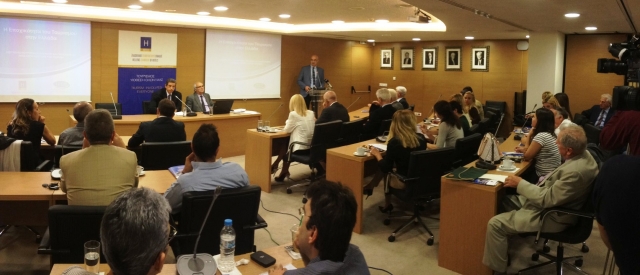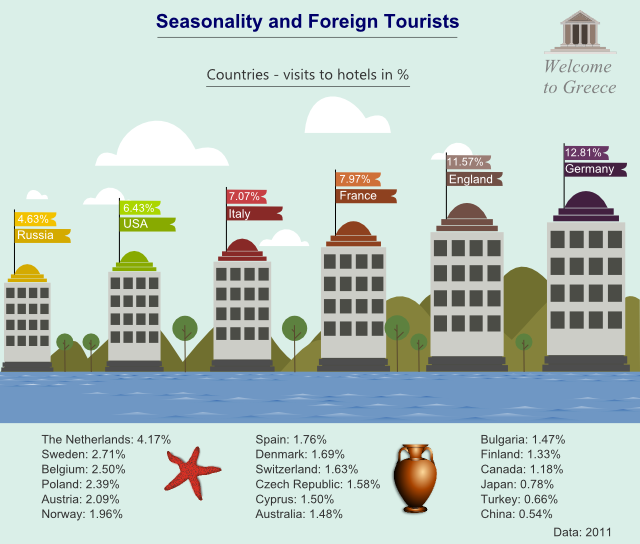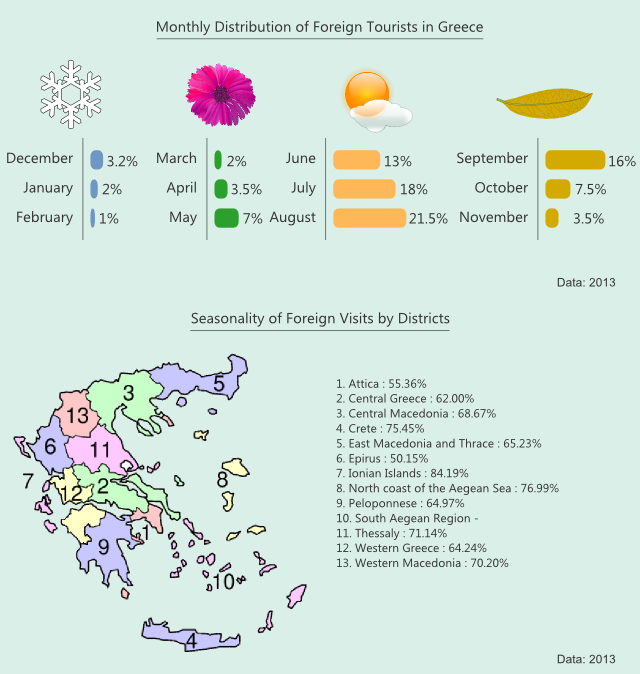Photo: fineartamerica.com
Simona Peneva
Seasons, climate, nationality and place of residence are among the most important criteria that dictate tourism development worldwide. It turns out that in Greece, the level of seasonality is very high in almost all tourist areas and hot temperatures always attract more tourists. In other words, the main influx of tourists is in the summer months and this limits the development of tourism in Greece, which is also a key factor of the national economy.
Striving to develop ways to attract tourists to Greece all year round, not just in summer, public and private tourism organizations and the Ministry of Tourism have drawn up a new strategic model, different from that used in recent years. Two new laws for the development of tourism are already in force, which enable the development of tourism infrastructure and new tourism products as well as the support for alternative forms of tourism such as agritourism.

The monthly distribution of visits to Greece in 2013 shows that from June to September, their percentage was 69.68% whereas from May to October, it reached 86.50%. The lowest number of visits, namely less than 500,000, was reported in February, and the highest, nearly 4 million, in August. While the number of foreign tourists increased after 2008, the number of Greek tourists recorded a slight increase until 2010 and then a small decline until 2012, because of the crisis. Compared to competitive countries such as Spain, Italy and Portugal, Greece and Cyprus reported a significantly higher number of foreign tourists after the year 2000.

A piece of research conducted in 2011 shows that Germans stayed at hotels most frequently, 12.81%, whereas only 6.43% of Americans preferred hotel rooms, followed by Spanish tourists, 1.76%, Bulgarians, 1.47%, and Chinese stayed at hotels most rarely, 0.54%. Another piece of research from 2013 shows that 60.50% of the tourists who visited the Ionian Islands arrived in the period from May to October, whereas only 23.50% of those tourists who preferred mainland Epirus visited it during this period. 32.50% of tourists who decided to visit Attica did so during the peak season, making it one of the areas with the best distribution of visits throughout the year. It is an interesting fact that the number of overnight stays of foreign tourists increases with the rise in the average temperature. At an average temperature of 10°C, the monthly overnight stays were less than 5 million, whereas at an average temperature of about 29°C, they reached almost 38 million.
The reasons for the high seasonality according to the survey of the Institute of Tourism Studies and Outlooks on the one hand are natural, including especially the climate, and on the other, institutional, such as religious holidays and school holidays, as they play a major role in determining the time for vacations and holidays. One of the conclusions of the study is that those tourists, who visit Greece most often, frequently choose to do so during the peak season from May to October. Some of them are Germans, Italians and Russians.

To distribute the number of tourists equally throughout the year, the Institute suggests providing incentives to the businesses that invest in alternative forms of holidays and vacations and to the tourists who choose to visit the country in non-peak periods. Greece will try to attract tourists from outside the European Union who would visit it outside the summer months, as well as elderly tourists and those who are interested in alternative forms of tourism.
"The high seasonality undermines the viability of tourism companies, as, regardless of how developed an enterprise is, it cannot survive twelve months having worked only during four or five of them," as stated by George Tsakiris, president of the chamber of hoteliers in Greece, adding that this problem is due to the lack of a strategy on the part of the state and the regional authorities, which leads to poorer results in the tourism industry.
According to him, in order for the concentration of tourist visits in the summer months alone to be overcome, everyone operating in the sector must assume responsibility, which was the motto of the conference "Tourism - responsibility of all of us." The concentration of tourism in the summer season alone negatively affects the activity, the national economy and the financial situation of the enterprises.